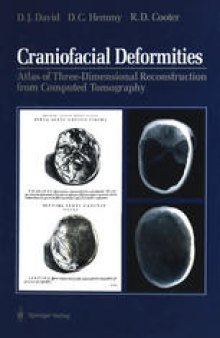 جزییات کتاب
جزییات کتاب
This book has been assembled from the radiographic and photo graphic records of patients presenting to craniofacial units on four continents over 7 years. It is our purpose to illustrate a wide range of craniofacial deformities with the technique of three-dimensional com puted tomography. Many topics are briefly addressed with descriptive text intended to amplify the accompanying images but not to exclude the need for more comprehensive references as recommended in the reading list of each chapter. The ability to generate three-dimensional radiographic images rep resents a successful integration of computed tomography with com puter graphics. Although this technique remains an electronic substi tute for the study of dry skull specimens, it offers a permanent pictorial record of anatomical structures with the opportunity for fu ture interactive data manipulation. It is hoped, therefore, that this work will assist others to gain a more complete understanding of disorders of the craniofacial region. We encourage other surgeons and investigators to examine and employ the techniques used to gather these images but also to ensure that standardized scanning regimens are adapted. The importance of data collection within its full anatomical context was borne out with many of our early studies, which were limited owing to computational con straints. Often an image requirement for surgical intervention is much less than an image necessary for strict scientific inquiry.



 دانلود کتاب
دانلود کتاب

 جزییات کتاب
جزییات کتاب





 این کتاب رو مطالعه کردید؟ نظر شما چیست؟
این کتاب رو مطالعه کردید؟ نظر شما چیست؟
